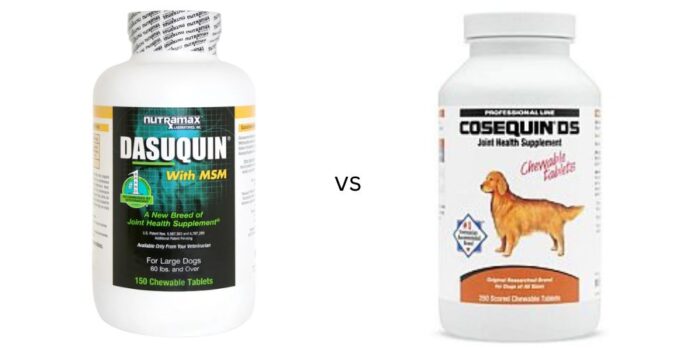Last Updated on September 18, 2023 by Fumipets
Dasuquin vs. Cosequin: What’s the Difference?
An article comparing “Dasuquin vs. Cosequin” typically explores the differences between these two widely-used joint supplements for pets, often focusing on dogs and cats.
It discusses their ingredients, formulations, and intended uses. Both products are commonly used to support joint health and manage conditions like arthritis in pets. The article may provide insights into which product might be better suited for specific situations, depending on factors such as the pet’s age, size, and health condition.
Dasuquin vs Cosequin
The functionality of a dog or cat’s joints may start to decline as they become older. Degenerative joint disease (DJD) and osteoarthritis are typical symptoms in senior dogs and may affect the hips, stifles (knees), or other joints. Both Cosequin and Dasuquin are examples of nutraceuticals, a kind of dietary supplement that attempts to provide nutrients to support cartilage health and repair as well as ease the signs of joint discomfort and canine arthritis.
Joint Problems in Dogs: A Quick Overview
Dogs often develop hip dysplasia, degenerative joint disease, osteoarthritis, and elbow dysplasia, particularly in certain breeds. As two bones come together to create a flexible joint, joint cartilage acts as a robust shock-absorbing cushion. Synovial fluid, also known as joint fluid, acts as a lubricant to keep everything moving smoothly. The cartilage may become pitted and grittier with age, joint injury, or illness, and less synovial fluid may be generated.
You may be wondering whether giving your dog or cat a joint supplement would be acceptable if you’ve observed they’re slowing down or displaying indications of joint illness. To assist you in deciding which could be best, we will compare Cosequin and Dasuquin in this post. Naturally, before beginning any new supplement or therapy, always see your veterinarian for a full diagnosis and discussion.
Overview of Dasuquin
Dasuquin is a canine joint supplement that comes in soft chew and tablet forms. With its active components, it seeks to promote joint health. Dasuquin for cats is available as sprinkle capsules or soft chews. Glucosamine, chondroitin, MSM (Methylsulfonylmethane), and ASU (Avocado/Soybean Unsaponifiables) are all ingredients in Dasuquin for dogs. With the inclusion of manganese, Dasuquin for cats also includes glucosamine, chondroitin, and ASU.

What are the active ingredients of Dasuquin?
Since they are essential components of cartilage, the body spontaneously produces glucosamine and chondroitin. It is believed that using them as supplements helps speed up cartilage restoration. Dasuquin contains MSM, also known as methylsulfonylmethane, which is a naturally occurring compound with anti-inflammatory effects. MSM seeks to combat the inflammation that occurs in arthritic or damaged joints in order to enhance function and lessen discomfort. Dasuquin is supplemented with ASU, or Avocado/Soybean Unsaponifiables, which has anti-inflammatory qualities in addition to protecting cartilage and supporting joint function.
How do I give Dasuquin to my pet?
Dasuquin is often simple to administer to your dog since they will frequently accept it as a treat straight from your hand, however if necessary, the pills may be buried in food or another treat. Given that the sprinkle capsule may be added to their regular meal, cats often happily take it. If your cat sometimes refuses to complete his food, you may start by giving him a smaller portion of Dasuquin and wait until he has finished it before giving him the remainder of the meal. Both dogs and cats get daily doses of dasuquin.
How quickly might I see my pet’s condition improve?
The supplement will take around 4 weeks to “load” into your pet’s system. You could notice a change or improvement in your pet’s symptoms after around 4-6 weeks. Increases in activity levels may be mild at first.
What can Dasuquin be used for?
Dasuquin is often used to treat osteoarthritis in animals, a typical ailment of old age. Additional disorders include joint issues after orthopedic surgery or joint damage, such as hip dysplasia. To find out whether Dasuquin will work for your dog’s joint issues, you should first speak with your veterinarian. Before beginning any supplements, always let your veterinarian know since they may interfere with the medications your pet is currently on.
Pros
Available in soft chews and chewable tablets which should make them easy to give.
Contains the additional ingredient ASU from avocado and soybean which is thought to further reduce inflammation.
Manufactured by a well-known company.
Available for both dogs and cats.
Cons
The addition of ASU causes digestive upsets for some dogs.
A small number of dogs may suffer from a soy allergy, making Dasuquin unsuitable for them.
Often more expensive than Cosequin.
Overview of Cosequin
Another well-known brand in the nutraceutical industry is Cosequin, which is offered in a variety of formulations for horses, dogs, and cats. Glucosamine, chondroitin, and MSM are ingredients in Cosequin. Moreover, some variations include Omega 3. Soft chew, sprinkle capsule, and chewable tablet forms of Cosequin are all readily accessible. There is a smaller version of the soft chew available for dogs, which may be more palatable to toy breeds. There is just one size of sprinkle capsule for cats.

What are the active ingredients of Cosequin?
The active components of Cosequin include glucosamine and chondroitin, which are included to help with cartilage repair and maintenance. MSM (Methylsulfonylmethane) is introduced for its capacity to reduce inflammation. Omega 3 is included in certain canine Cosequin formulations.
In what formulations is Cosequin for horses available?
Horses may be fed Cosequin as a powder, pill, or pellet. Glucosamine and chondroitin are included in the conventional formulation, but a variant version that also includes hyaluronic acid, avocado/soybean unsaponifiables (ASU), and methylsulfonylmethane (MSM) is also available (HA).
How do I give Cosequin?
Since Cosequin comes in a variety of forms, it is often easy to guarantee that your pet will take the supplement with no problems. The tablet shape may be disguised as a favorite treat, or dogs will take the chew as a reward. The sprinkle capsules may be added to the regular diet of cats and pickier dogs. The supplement may be given to horses as a little reward or combined with a small quantity of hard feed.
What can Cosequin be used for?
The most popular use of cosequin is for the treatment of osteoarthritis. It may also be utilized in other situations, such as after joint surgery, injury, or joint illness for other causes (such as elbow dysplasia). If you think your pet might benefit from starting on Cosequin, talk to your vet about it.
How quickly can Cosequin work?
Cosequin is not a supplement that works instantly; it takes about a month for it to accumulate in your pet’s system. You could see some changes or improvements in your pet’s health after around 4-6 weeks. If it is helpful to your pet, then you should continue to use it.
Pros
Anti-inflammatory MSM can help to decrease joint pain.
Additional omega 3 also acts as an anti-inflammatory and can have benefits for the coat and skin.
The active ingredients may reduce cartilage breakdown.
Sprinkle capsule version available for dogs if a tablet or chew isn’t readily accepted.
Cons
Some owners report that Cosequin has a strong odor.
Some dogs won’t eat the chew version readily.
No ASU compared to Dasuquin.
How do I know if my dog or cat needs Dasuquin or Cosequin?
Arthritis may not be obvious. Your pet may progressively become less active over time, which is often the first difference you would notice. Dogs could become less eager to take their customary strolls, or they might be hesitant to get in the vehicle or go up and down stairs. Your dog could seem to be stiff, especially when they initially stand up.
With cats, joint issues often appear more subtly, but you could notice they are less inclined to play, leap up on the sides, or scale fences in the backyard. It might be difficult to see when a cat is noticeably stiff.
Your pet’s behavior may alter significantly as the condition of their joints changes. A pet with pain may live with a worse quality of life. Naturally, no one wants to see their animal buddy in pain, so you would naturally search for ways to assist. Cosequin or Dasuquin, for example, are dietary supplements that may be effective in the battle against joint illness. In addition to reducing inflammation, nutritional supplements like Cosequin and Dasuquin work to safeguard the joint cartilage from additional harm.
Make an appointment with your doctor for a checkup with your pet if you are worried that you are observing changes in their activity levels. You may discuss with the doctor if a joint supplement would be appropriate and advantageous for your cat or dog.
Which one should you use?
Cosequin and Dasuquin are available for dogs and cats and have the same active ingredients—glucosamine, chondroitin, and MSM. Another essential element in Dasuquin is called ASU, or Avocado/Soybean Unsaponifiables.
Cost
Cosequin often costs less than Dasuquin. The formulation of the two supplements is essentially similar, with the exception that Dasuquin has ASU added. Dasuquin will work better for certain dogs, hence the price increase could be justified.
Flavors
To make the chews, pills, powder, or capsules more pleasant for the target species, Cosequin and Dasuquin incorporate extra tastes. One brand could be more appealing to certain dogs than the other. If your pet isn’t taking one well, it could be worthwhile to try a new taste, formulation, or supplement.
Dasuquin vs Cosequin: Which species are they suitable for?
There are dasuquin formulations for both dogs and cats. There is a sprinkle capsule version for cats, and a soft chew or chewable tablet form for dogs.
Horses, cats, and dogs may all use cosequin. Although the cat formulation is only available as a sprinkle capsule, dogs may choose from a soft chew, chewable pill, or sprinkle capsule. Owners of horses may feed their hoofed friends pills, powder, or pellets.
It goes without saying that you must use Cosequin if your horse has tight or aching joints since Dasuquin does not come in a horse formulation.

Dasuquin vs Cosequin: Sizes available
For dogs weighing less than 60 pounds, dasuquin is offered in small-medium and big dog sizes (for those over 60lbs). There is just one size of cat sprinkle pills available.
Both a miniature dog version (for dogs under 25 pounds), which is simpler for small breeds to consume, and a conventional dog size are offered by Cosequin. There is just one size of the cat sprinkle capsule.
Are there any safety or contraindications when using Cosequin or Dasuquin?
Consult your veterinarian before beginning any new supplement or therapy, as is customary. This is due to the fact that it is crucial to properly analyze your pet and determine what may be the source of their joint issue. Assuming instantly that an old dog has arthritis might be dangerous if they really have something else going on.
Your veterinarian will evaluate your pet’s general health and any other drugs they may be on after evaluating them. Then, your veterinarian will be able to suggest whether Cosequin or Dasuquin would be a good supplement to give your pet. It is recommended to obtain expert guidance from your vet since certain drugs may interfere with the active substances in these nutraceuticals.
Sometimes, certain chemicals in Cosequin or Dasuquin may make certain animals sensitive, leading to problems including stomach distress or, very rarely, an allergic response. Always seek guidance from your veterinarian if you have any reason to believe your pet isn’t responding well to the supplement you are giving him or her or if you have seen a possible negative effect.
Conclusion
Common nutraceuticals that may be utilized to enhance joint health and function are dasuquin and cosequin. The sizes and formulations that are available, along with the active substances used, vary somewhat. You may need to try the product to determine how well it is taken, tolerated, and if your pet’s symptoms improve since one brand may fit your pet more than the other. Prior to determining if you believe a supplement is having a positive impact, it is crucial to give it at least 4-6 weeks.
Sample Questions and Answers:
What is the main difference between Dasuquin and Cosequin?
The primary difference lies in their formulations. Dasuquin often contains additional ingredients like ASU (avocado/soybean unsaponifiables) and MSM (methylsulfonylmethane), which are not found in standard Cosequin.
Which pets can benefit from Dasuquin or Cosequin supplements?
Both supplements are typically used for dogs and cats suffering from joint issues, especially arthritis and hip dysplasia. They can also be used as a preventative measure for aging pets.
Are there any potential side effects associated with Dasuquin or Cosequin?
These supplements are generally considered safe, but some pets may experience mild gastrointestinal upset. It’s essential to follow the recommended dosage and consult with a veterinarian if you notice any adverse reactions.
Can I switch my pet from Cosequin to Dasuquin or vice versa?
Switching between these supplements should be done gradually, as sudden changes in a pet’s diet or medication can cause digestive issues. Consult your vet for guidance on transitioning.
Which joint supplement is more suitable for older dogs with severe joint problems?
In cases of severe joint issues in older dogs, Dasuquin might be a better choice due to its additional ingredients, which can provide more comprehensive joint support. However, consult with your veterinarian for personalized recommendations based on your dog’s specific condition.


















